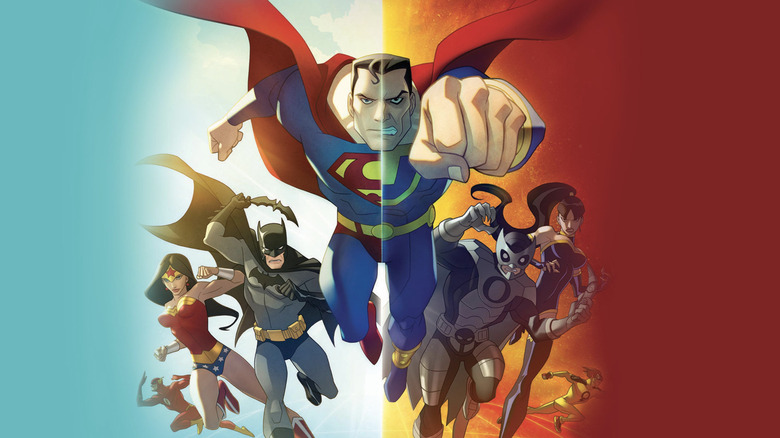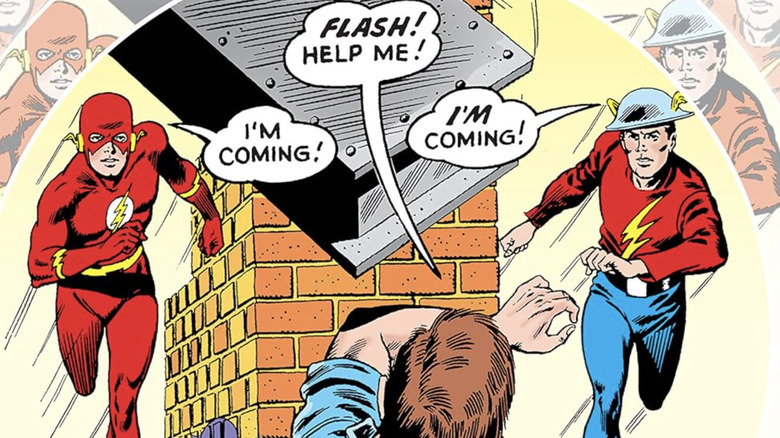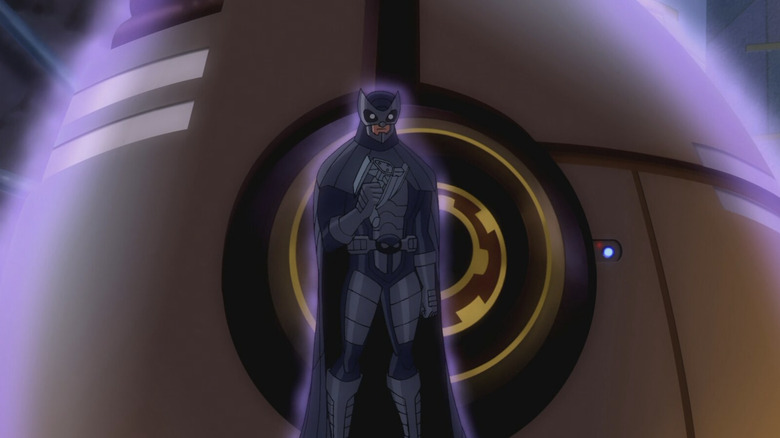Many Superhero Movies Have Been About The Multiverse – But Only One Got It Right
We may receive a commission on purchases made from links.
Back in the 2010s, superhero movies adopted the "cinematic universe" as their storytelling framework; like the comics, separate franchises with unique lead characters existed within a common setting and would cross over. In the 2020s, cape-flicks leveled up to the multiverse, where each past version of a screen superhero also exists and can interact with the current ones. It's all really an excuse for easy nostalgia plays and inside jokes, hence Michael Keaton showing up as Batman again in "The Flash." (Not that it helped the movie succeed.) Last year's "Deadpool & Wolverine" was similarly all about Disney buying out 20th Century Fox and discarding the latter studio's Marvel franchises.
For my money, only one superhero movie has used the multiverse in a way befitting true science-fiction rather than just picking and choosing favored action figures for a single play-set. It's a relatively obscure one too: 2010's "Justice League: Crisis on Two Earths," directed by Sam Liu & Lauren Montgomery and written by the late, great Dwayne McDuffie. In the film, the Justice League must face their counterparts from an alternate reality. Known as the evil Crime Syndicate, these villains besiege their own world with aspirations to rule it outright.
"Crisis on Two Earths" has an intricate backstory. It was originally written to connect to the animated "Justice League" series, set between the original show and the sequel "Justice League Unlimited." The film, at the time titled "Justice League: Worlds Collide," then got shelved. "Justice League" and the whole, long DC Animated Universe (DCAU) really kickstarted my love for superheroes, so when I read about the shelved "Worlds Collide"? Man did it sting. Then a couple years later, the script was produced — but as a standalone feature, with some small edits plus a different art style and voice cast from the animated show. (The original script, penned as in-canon with the DCAU, is available to read on McDuffie's website.)
Now, animation-wise, "Crisis On Two Earths" is nowhere near as formally confident and daring as either "Spider-Verse" film. Instead, it's got the fairly plain DC Animated movie house style, which is not as charming as the distinctive Bruce Timm look of the DCAU either. But McDuffie's script, even altered, keeps the film afloat.
Superheroes use the multiverse as metatext
It's tempting to blame the commercialism of Hollywood for superhero multiverses, but that's not really true — they're only following the comics' lead. Superheroes have always used the idea of parallel worlds in meta, fan-satisfying ways. It goes back to the original DC multiverse story: "The Flash of Two Worlds," by writer Gardner Fox, editor Julius Schwartz, and artist Carmine Infantino, published in "Flash" #123 in 1961.
Context: The Flash debuted in 1940, created by Fox and artist Harry Lampert, and his secret identity was Jay Garrick. The Flash disappeared from newsstands in 1951, until a reboot five years later. 1956's "Showcase" #4 introduced a new Flash — Barry Allen — created by Infantino and writer Robert Kanigher. Fox then brought back his Flash by revealing Jay Garrick lived on a parallel Earth (Allen's was labeled Earth-1, and Garrick's became Earth-2).
Earths 1 and 2 kept crossing over in DC Comics for the next 25 years until Marv Wolfman and George Pérez's "Crisis On Infinite Earths." DC had decided to reboot and streamline its continuity, and "Crisis" did that by destroying the multiverse and placing all the survivors in a singular reality. "Crisis" is an influential, spectacularly-drawn comic, but it was also a sign of superhero comics moving in a more insular direction — one governed foremost by continuity.
Some superhero comics use the multiverse-as-metatext in more clever ways. Grant Morrison and Frank Quitely's "JLA: Earth 2" (the main influence for "Crisis on Two Earths") takes apart superhero comics' rule that the good guys must win at the end. On the Crime Syndicate's parallel Earth, it's the opposite: evil is the natural state of things, so the Justice League's efforts to help are doomed.
Likewise, "Spider-Man: Across The Spider-Verse" uses the multiverse to reflect on the hero's journey, lampooning fans who demand "canon events" happen over and over and suggesting Miles Morales, a totally different Spider-Man, can break the canon cycle.
Admittedly, "Crisis on Two Earths" definitely has some meta touches too. The whole "mirror universe" concept of the movie plays on flipping fans' expectations; here, the Justice League are bad guys, and Lex Luthor is the world's only hero. The film also has its fun filling out the ranks of the Crime Syndicate's "Made Men" with evil C-list DC heroes too.
However, the movie goes into more philosophical territory from there thanks to its primary villain: Owlman, the evil Batman (voiced by James Woods) for whom the vastness of the multiverse represents not wonder and possibility, but infinite nothingness.
Owlman and the hidden nihilism of the multiverse
The multiverse is not total science-fiction. Its existence is unproven, of course, but it has a theoretical basis in real quantum physics. A wave function (the mathematical expression of a quantum system, which can provide the probability of where a particle will be found) is said to "collapse" after a definitive measurement is made. The "many-worlds interpretation," devised by physicist Hugh Everett, instead proposes that when a quantum system is measured, all possible measurements play out across many universes.
Compare the Schrödinger's Cat thought experiment, itself derived from the idea of quantum measurement; if you stick a cat in a closed box, there's no way of being sure if the animal is alive or dead, so technically, it's both and neither.
Experts have noted how viewing the world this way creates some chilling philosophical implications; as individuals and the collective whole of humanity, we cherish our uniqueness. If every permutation of "us" exists on one plane of existence, that uniqueness is eliminated. This is the root of Owlman's nihilism, though he defines reality as branching based on people's choices, rather than the behavior of particles (this is a character-driven narrative).
"Every decision we make is meaningless because somewhere, on a parallel Earth, we have already made the opposite choice. We're nothing. Less than nothing," Owlman explains. His analysis isn't wrong, per se; it's coldly rational under a certain lens. But you'd have to be immensely amoral to conclude this makes humans' lives "meaningless" — which Owlman is, so he wants to destroy the original "Earth-Prime," thinking this will cause all other realities to collapse. "The only action one could take that would have any purpose," he calls this, because destroying all reality is the only decision that can't happen the opposite way on another world.
Woods gives a chilling performance as Owlman; calm and sinister, the opposite of his most famous voice role as the talkative Hades in "Hercules." On the other hand, "Crisis On Two Earths" would have benefited from casting Kevin Conroy as Batman again, rather than understudy Billy Baldwin, as this would give Batman and Owlman's already fantastic battle an extra kick.
I can hear Conroy delivering Batman's lines to Owlman so clearly in my mind, particularly his farewell: "There is a difference between you and me. We both looked into the abyss, but when it looked back at us ... you blinked." Both men faced despair, but only one surrendered to it.
Owlman's character is an evil Batman, yes, but it's deeper than just the novelty of having the Dark Knight as a villain; he's a foil to Batman's ethos of will and determination, that one person can make a difference. Owlman would rather destroy everything than live with the "illusion of free will," while Batman sees the world for all it is, darkness and light, and strives to make it better with faith that others, even his foes, can be better. If there's anything that "Justice League: Crisis on Two Earths" teaches us, after all, we're all the sum of our own, distinct choices.


